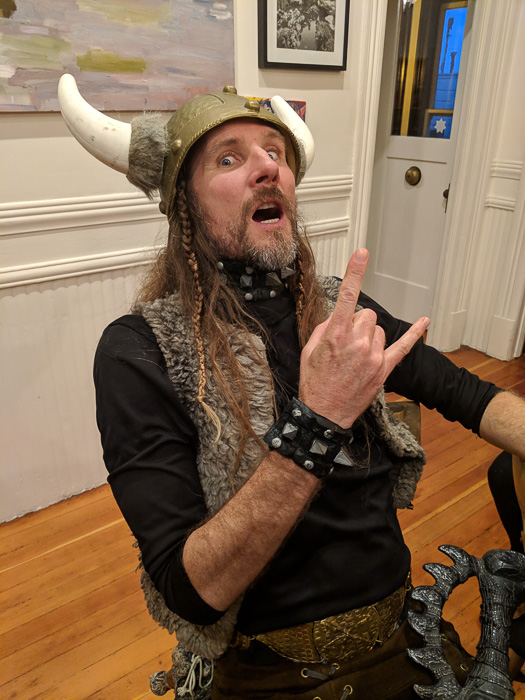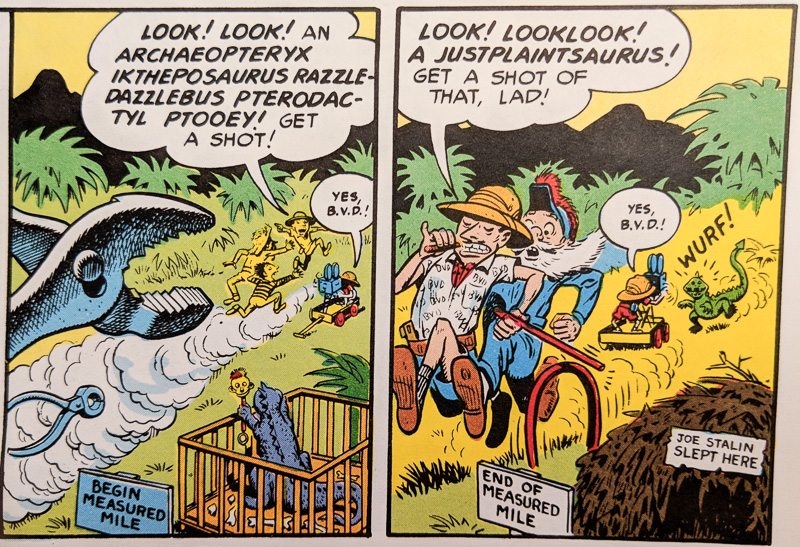I’m thinking about writing an SF tale involving what we sometimes call digital immortality. It’s a theme I’ve often returned to, starting with the writing of my Software novel in 1979-1980. We’re almost at the point where a low-end cloud-based model of you is possible. At present these are thin, pixelated constructs with cardboard search-engine Eliza-type personalities. Call them toy ghosts. Later in this post I’ll get onto the topic of something richer, which I’ll call juicy ghosts.

Speaking of toy ghosts, I’ve often referred to this kind of emulation as a lifebox. You read my whole analysis of building lifeboxes online in the “Lifebox” section of my tome, The Lifebox, the Seashell, and the Soul.
I’ve actually constructed a rudimentary lifebox that weakly emulates me. See my interactive Search Rudy’s Lifebox page. Type, say, the words “software novel” into the Search box and press enter.
The Google-supported algorithm will throw up some ads as the first two or three results, but after that there’s good solid links into pages of my vast website www.rudyrucker.com. And not that there are pages and pages of search results, you can flip through them using the page numbers at the bottom of the list of results.

So, like I’m saying, if you put “software novel” in the search box, you’ll get links pages that involve my Software novel, which is, again, where my notion of the lifebox began.
Or if you especialy want to know about the lifebox concept, you might just put”lifebox” in the search box. In telling you this, I’m going meta on your ass.That is, I’m telling you to ask my lifebox page to find out what I think about the lifebox.
More fun: If you want know about the photo above, run the search on “Terence McKenna”. Or just plain “Terence” will do. Even though he’s dead, he’s still my friend.

This weekend I was talking to my son Rudy Jr. (CEO of Monkeybrains.net, who host this blog) about where lo-res current-tech cloud-based toy ghosts would be hosted. By hosting a ghost, I mean two things.

[This is not Rudy Jr., this is a big wave surfer called John Bowling whom we know. I like the Viking hat so much that I put it into a Surfin’ SF story I recently wrote with Marc Laidlaw.]
(Ram) Store and maintain a large data base (what I’ve sometimes called a lifebox) of the person, along with the code for a program that can use the data to emulate the personality.
(Crunch) Provide processing power to run a simple-ass data-intensive personality emulation code on the data base.

[Yes that’s a toy ghost version of me, age 17, in the Chevalier Literary Magazine 1963, Louisville, Kentucky.]
For awhile I had a retrograde notion that some companies like Google or Facebook or Amazon might host toy ghosts on enormous supercomputers. What I was calling silos. But that’s an outdated way to think. Rudy Jr. pointed out that most storage and processing is distributed, with chunks of it scattered across a zillion nodes.

Rudy also made the point that there’s always going to be limited space on the nodes—not enough to immortalize everyone— so a kind of fitness function determines who gets to have, and to keep, a toy ghost. That is, if a toy ghost is to continue to living in the internet cloud, people have to be looking at it and interacting with it. The system’s automatic garbage removal will prune away all traces of a ghost that’s rarely visited.

This a bit like the author’s perennial quandary: Which books remain in print? Which books continue being stocked in libraries? Which books remain readily accessible online? And pirated editions are better than none!

[I happened to see this on a wall in Los Gatos by random coincidence. To me it feels relevant, because my friend Greg Gibson in Massachusetts son Galen was killed in a school shooting some years ago. Greg is currently running a GoFundMe to support the publicizing of an unusual gun control video ad that Greg is working on. Check out the campaign and see Greg’s moving pitch video.]
It may be that an internet toy ghost is designed with an “instinct for self-preservation,” so it’ll promote itself. Similar to the original philosophy-of-language Richard-Dawkins-type meaning of “meme,” a sticky, catchy, useful thought that impels people to pass it on to others, thus reproducing itself. The older notion of meme kind of assumes that the meme has some heavy intellectual content or survival value.

These days an “internet meme” just means something like a phrase or image that people repost. Cat pictures, for Christ’s sake. But I admit I’m intrigued by the subcategory of “dank memes,” which seem to be flashes that make stoners laugh.

[Frames from the immortal Will Elder’s early Mad magazine strip, “Ping Pong” (parody of “King Kong”).]
A toy ghost might say, “I seem to be a meme. Kan I has cheezeburger?”

How do you kill a toy ghost that lives on the internet? Say it’s an emulation of a martyred rebel, or of a dead oppressor. Some faction wants that toy ghost gone. How to quash it?

(a) We might invoke the notion of a smart malware bot that finds and erases all scraps of info relating to that toy ghost. I remember a scene in a Bill Gibson novel where an obnox virus-thing slides under the door of a virtual room, and a shape like a cockroach eats it, and one of the guys says the cockroach had “offered criticism.”

But in practice I’m not sure if/how that would work. The scraps of the toy ghost could disguise themselves. It’s hard or impossible to search the whole web and remove all traces of something. And the ghost cold be continually redistributing and coding and re-encrypting itself. And it sounds kind of boring to read about.

[My old pal Eddie Marritz the famous cinematographer.]
(b) Or the oppressor might make sure the targeted toy ghost doesn’t show up in common search engines. (Eyeball kick: an online program that searches for specific toy ghosts might be called “The Book of the Living Dead.”) If you can hack the search engines you can make a given ghost be effectively invisible, And by reducing its registered hits you make it likelier to be pruned.

Like if the magazines refuse to review your books, you’re more likely to go out of print.

(c) Another way to lower the effectiveness of a ghost, it to make sure that whenever the ghost is accessed, a shitty stupid parasite shows up with it. Like an unshakable troll commenter or spammy-ad link. Degrading the ghosts’ reputation, making it be treated as malware or as spam.

Toy ghosts have wireless contact with Earth peripherals. This is a move in both Wm. Gibson’s The Peripheral, and in Cory Doctorow’s Walkaway.. Your toy ghost might talk to you on the phone. Like a type of smart cloud storage. Or a highly personalized assistant.

A ghost can be more autonomous and robust if it’s a biocomputation than if it’s an internet chip-based and system-moderated computation. So escaping from the digital to the analog would greatly empower a ghost. And being juicy or biological makes a ghost safe.

[Great painting by Stanley Whitney in the Harlem Studio Museum exhibit at the MoAD (Museum of the African Diaspora) in SF, right around the corner from SFMOMA]
If you’re juicy, you’re “in the wild” and not living on a human-built net by the sufferance of the internet operating systems and protocols. You aren’t subject to the ravages of the mindless internet pruning bots.

And the trick of converting a toy ghost to a juicy ghost is something that a rebel programmer called Gee Willikers has mastered. He found the trick of ghost migration while he was designing the weaponized wasps. In the process of his biohacking to create the Turing wasps, Gee Willikers learned to program living organisms. The organism runs a program on its neurons, in its hormone flows, in its DNA, it’s quantum computations, whatever. It’s tricky to port a block of info as large as a toy ghost onto an organism. The organism has to be temporarily paralyzed, like with cone shell toxin. Not even breathing.

My character Curtis Winch is going to make a really aggro move against a certain evil politician called Ross Treadle on the occasion of that guy’s third Presidential Inauguration. Curtis is going to use a tweaked, weaponized “Turing wasp” to temporarily paralyze Ross Treadle

[This is my artist friend Vernon Head with me at the SFMOMA Magritte Show. I almost feel like this image is a dank meme. :)]
And then one of the Turing wasps installs a copy of Curtis’s online toy ghost within Treadle’s bio processes. And then a rich new Curtis Winch will awake, hosted by Treadle’s body. And this won’t be just a chintzy toy ghost. No, man, this virtual Curtish Winch be a juicy ghost. And a bio-hosted juicy ghost, is much richer than a toy ghost. The “vital force” is real. It involves the richness of structure and function in living cells.

And now, having parasitized our illegitimate “President,” our juicy ghost is in a position to kick some serious butt!









February 14th, 2019 at 11:54 am
This has a lot of promise. I’d suggest that a toy ghost might obtain or retain enough skills to be employable as a coder or whatever it was in life, and use the resulting income to buy its own server. Gmail began by saying it had out money in escrow to keep its original server farm going for sixty years, which sounded good to people who had email providers tank on them; next of kin could set up a safe server to host Granma’s ghost for a long time. Toy ghosts would work cheap, too; they don’t need food or shelter, just RAM.
Say you were a minor pop star when you died and became a toy ghost; three years later your new album drops and you have a hit. Would they bring you back as a hologram for the tour? Could a canned mind learn and grow enough to produce original art, or would it just repeat earlier themes? Question, questions, questions, running through the mind of the concerned old person today.
February 22nd, 2019 at 5:48 pm
Well, doc, those cat pictures do have a fitness that helps the buggers propagate. They aren’t useful to us, but neither are termites. Fitness dont care about individuals. No how.
March 7th, 2019 at 9:00 am
I have long since given up on immortality, and I will settle for reproducibility. If in the far future some of my ideas survive and thrive, then my life will have been well spent. To this end I seek to express easily-stolen thoughts.